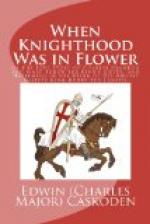When I presented myself to the king and told him of my marriage, he flew into a great passion because we had not asked his consent. One of his whims was that everyone must ask his permission to do anything; to eat, or sleep, or say one’s prayers; especially to marry, if the lady was of a degree entitled to be a king’s ward. Jane, fortunately, had no estate, the king’s father having stolen it from her when she was an infant; so all the king could do about our marriage was to grumble, which I let him do to his heart’s content.
“I wish also to thank your majesty for the thousand kindnesses you have shown me,” I said, “and, although it grieves me to the heart to separate from you, circumstances compel me to tender my resignation as your Master of Dance.” Upon this he was kind enough to express regret, and ask me to reconsider; but I stood my ground firmly, and then and there ended my official relations with Henry Tudor forever.
Upon taking my leave of the king I sought Brandon, whom I found comfortably ensconced in our old quarters, he preferring them to much more pretentious apartments offered him in another part of the palace. The king had given him some new furnishings for them, and as I was to remain a few days to attend to some matters of business, he invited me to share his comfort with him, and I gladly did so.
Those few days with Brandon were my farewell to individuality. Thereafter I was to be so mysteriously intermingled with Jane that I was only a part—and a small part at that I fear—of two. I did not, of course, regret the change, since it was the one thing in life I most longed for, yet the period was tinged with a faint sentiment of pathos at parting from the old life that had been so kind to me, and which I was leaving forever. I say I did not regret it, and though I was leaving my old haunts and companions and friends so dear to me, I was finding them all again in Jane, who was friend as well as wife.
Mary’s letter was in one of my boxes which had been delayed, and Jane was to forward it to me when it should come. When I told Brandon of it, I dwelt with emphasis upon its bulk, and he, of course, was delighted, and impatient to have it. I had put the letter in the box, but there was something else which Mary had sent to him that I had carried with me. It was a sum of money sufficient to pay the debt against his father’s estate, and in addition, to buy some large tracts of land adjoining. Brandon did not hesitate to accept the money, and seemed glad that it had come from Mary, she, doubtless, being the only person from whom he would have taken it.
One of Brandon’s sisters had married a rich merchant at Ipswich, and another was soon to marry a Scotch gentleman. The brother would probably never marry, so Brandon would eventually have to take charge of the estates. In fact, he afterwards lived there many years, and as Jane and I had purchased a little estate near by, which had been generously added to by Jane’s uncle, we saw a great deal of him. But I am getting ahead of my story again.




